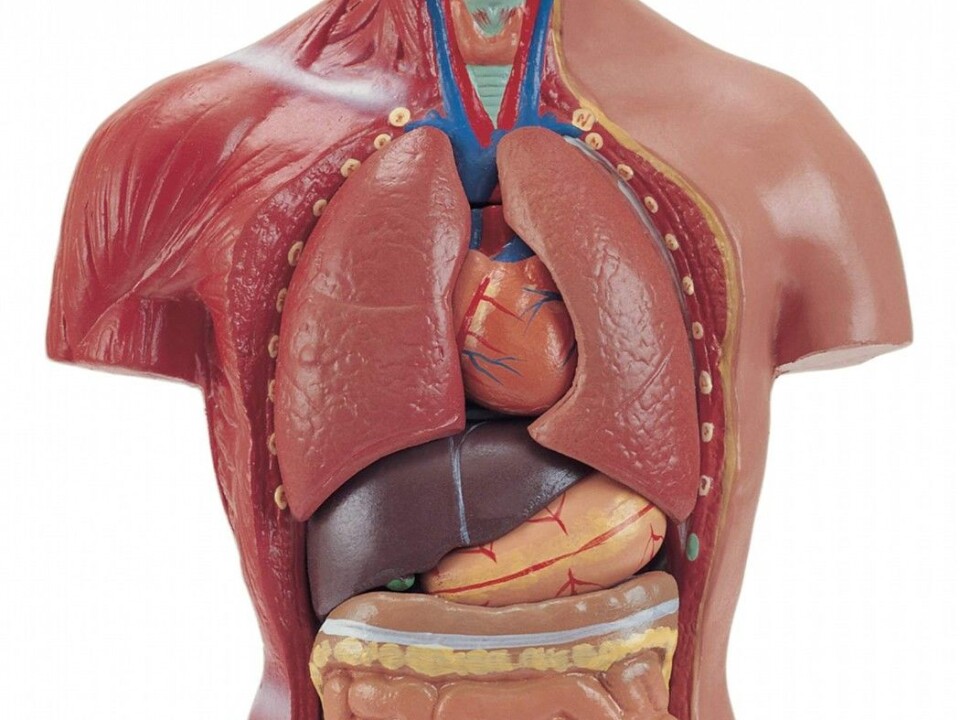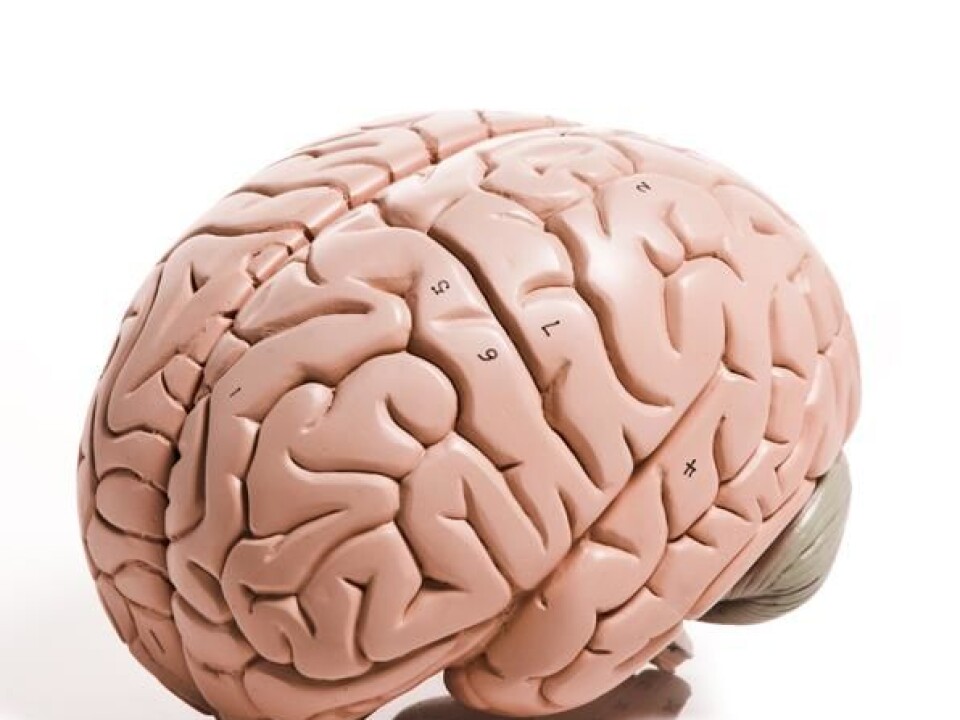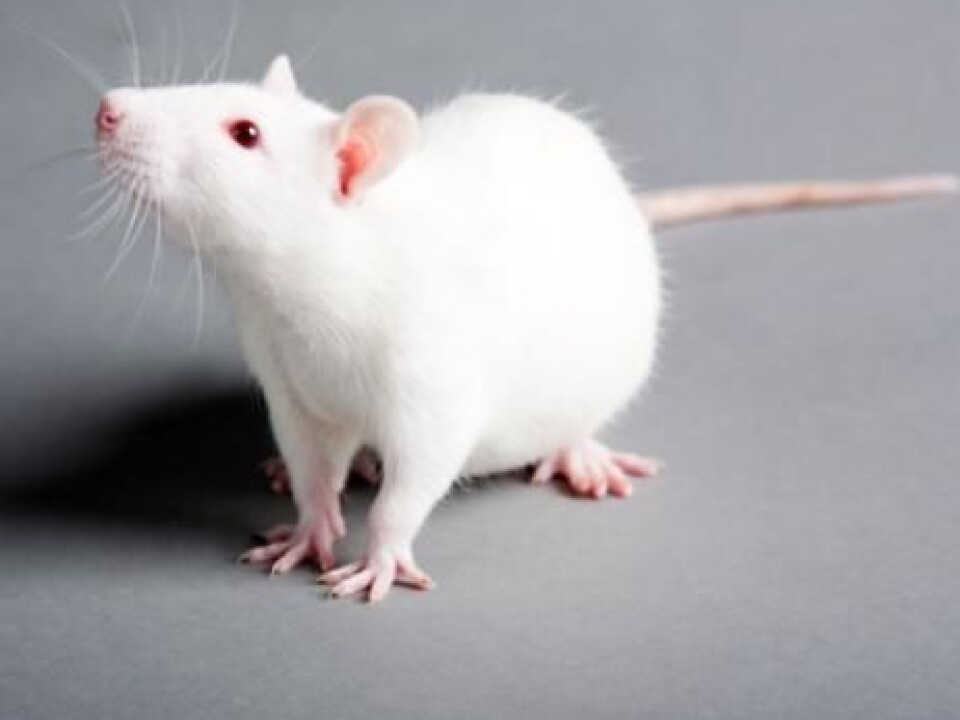
Poisoned from the inside
Can such a diversity of ailments as fibromyalgia, chronic fatigue syndrome, asthma, autism and irritable bowel syndrome all originate in the intestines?
Denne artikkelen er over ti år gammel og kan inneholde utdatert informasjon.
The notion of autointoxication – a poisoning stemming from contents of the intestines – is by no means new. In fact it’s old enough to have been shuffled into the outfields of medical ill repute nearly a hundred years ago.
But now it’s knocking on the door again, accompanied by three Norwegian gastroenterological researchers.
In recent years a mounting number of research results have turned up indicating that bowel flora can have a major impact on our health.
Our millions of intestinal bacteria are being suspected of not only playing leading roles in diseases such as intestinal cancer, irritable bowel syndrome (IBS) and inflammatory diseases of the bowels (Crohn’s disease and ulcerous colitis). Researchers think we can also find the key to illnesses such as obesity and autism in our guts.

Perhaps they even have a link with fibromyalgia and myalgic encephalitis/chronic fatigue syndrome (ME/CFS), according to Jørgen Valeur, Arnold Berstad and Tore Midtvedt, who recently wrote about this in Tidsskriftet for Den norske legeforening [Journal of the Norwegian Medical Association].
But this doesn’t necessarily involve an invasion of aggressive bacteria that are resistant to antibiotics. On the contrary.
Our coexistence with bacteria and an array of other factors can upset a fine-tuned ecosystem of microscopic partners. It could be these disturbances that make us ill.
Poisoned by the gut

“These are considerations rather than facts,” says senior researcher Arnold Berstad at Unger-Vetlesen’s Institute at Lovisenberg Diakonale Hospital.
He says it’s accepted that intestinal bacteria can produce or stimulate production of bioactive substances, i.e. substances that affect the body. In some cases these bioactive substances can have a toxic effect.
“I think these diseases can result when these bacterially produced substances get into the bloodstream one way or another.”
A mounting number of results link diverse afflictions such as fibromyalgia and IBS to a chronic, low-grade inflammatory reaction in the body. Berstad thinks substances from the gut could be the cause of such inflammations.

How they gain access to the body is another matter. Maybe the bacteria start producing more toxins? Or the substances pass more readily through the intestinal walls?
“There has been a lot of talk about a so-called leakage from the intestines in relation to various illnesses, but obtaining reliable measurements of this seems rather hopeless.”
Tests indicate that groups of persons with these maladies have intestines that are more readily permeated than those without them, but current methods for gauging this are too imprecise for a study of how this works in each individual patient.
So it probably wasn’t a detailed understanding of intestinal functions that prodded medical researchers to query whether digestion can be linked with many unexplained disorders.

Gastroenterological patients with CFS
Berstad’s point of departure was work with patients who had gastroenterological diseases.
“Among all the patients who had been referred to me for food intolerances, 70 percent also have fibromyalgia and/or ME,” he says.
Berstad isn’t alone in making that observation.
“We have been to gatherings for people with ME and asked them if they also have stomach or intestinal problems. Nearly all them raised a hand,” says Ragna Lind from the University of Bergen.
She has researched the connection between IBS and psychological symptoms such as anxiety and depression.
Patients in despair
“This is a misunderstood and neglected group of patients,” asserts Berstad.
Perhaps also a disbelieved one.
“I get patients who cry in my office because they have finally received credence. A grown man with an immigrant background was in despair because he experienced people thinking he was a slacker.”
“When patients tell a doctor they have other symptoms in addition to stomach maladies, the conclusion can be that this is a mental problem.”
Patients with a host of different ailments are sent on the rounds to various specialists for diagnoses, such as experts in allergies or digestive disorders. But often the doctors find nothing and the patient ends up in cognitive therapy.
But researchers we have spoken to do not think the main cause of such problems lies in the mind.
“It’s something else. Our hypothesis is that this can be a sort of ‘poisoning’ from the intestines,” says Berstad.
Important reflections
Dag Bruusgaard, a professor at the Institute of Health and Society at the University of Oslo’s Faculty of Medicine, thinks there might be something to this. He’s published an article that gives consideration to a possible common cause for several unexplained illnesses.
“I’m not a gastroenterologist, but intestinal flora have proven to be more exciting and important than we’ve thought. Still, I’m basically sceptical and think there could easily be other explanations.”
“Nevertheless, I think such reflections around matters that we don’t understand are highly valuable. These disorders pose a big challenge for the medical profession. Patients are suffering and it would be arrogant to claim that this is just a psychological matter.”
Bruusgaard refers to the results from the Haukeland study published earlier this year. It showed that in certain cases medications for cancer that restrain a special type of cells in the immune system yielded a dramatic improvement in ME/CFS patients.
This can indicate that ME/CFS is caused by immune response problems, which in turn is compatible with the intestinal flora hypothesis.
Even though intestinal bacteria might be at the heart of many illnesses, nobody should be led to think these ailments can be cured by getting rid of our inner flora. That trap has been wandered into already, with terrible results (see side story below).
Working for us
The human microbiome – the ecosystem of microorganisms in our bodies – is comprised of ten times as many cells as we have, Most of them live in the intestinal tract.
And these residents are not passive stowaways. They carry out vital jobs that our bodies cannot do on their own. For instance bacteria synthesize our vitamin K for us and digest some of the food that our intestines can’t break down.
“The bacteria are also our best defence against other bacteria. They’re more important than our immune system,” says Tore Midtvedt, professor emeritus at the Karolinska Institutet in Stockholm.
They probably have a wide range of other functions that we haven’t discovered yet. However, we know that bacteria are constantly communicating with each other and with us.
Messages to the brain
“The intestines contain most of the body’s immune cells and the hormone producing cells. The digestive tract is also connected to a comprehensive nerve system, which contains as many nerve cells as our spinal column,” explains Jørgen Valeur, assistant doctor at Lovisenberg Diakonale Hospital.
These three systems have an impact on bacteria – and the bacteria affect them in return. Intestinal bacteria and the brain actually communicate with one another.
The extremely essential vagus nerve leads directly from the intestines to the brain and messages run both ways through it. This means it can affect our bacteria, and very importantly they can affect us.
Bacteria change our genes
“The vagus nerve is in close contact with the limbic system which regulates our emotions. We still don’t know so much about how this nerve affects our emotional life but it’s been demonstrated that depression can be treated by stimulating this nerve with an electrical current,” says Valeur.
Tests with animals also confirm this.
The results of an experiment with mice were released in 2011. It showed that the lactic acid bacteria Lactobacillus rhamnosus, which is used in some types of yoghurt, reduced anxiety and stress behaviour of animals by affecting the vagus nerve.
In addition, the bacteria do more than trigger nerve messages. They actually change us by turning our genes off and on.
In 1996 one of Midtvedt’s own doctoral students discovered that the bacteria could turn on genes that made intestinal cells supply them with food.
“We know that bacteria species can switch off and on as many as 400 human genes,” he explains.
So there is also good reason for looking into what happens when the communication and interplay between us and our billions of inner pals are altered. Perhaps they can impact the substances produced in the gut and the selection of which of them slip by into our other body tissues.
Killing bacteria can lead to problems
“What does our use of antibiotics, disinfectants and preservatives do to our intestinal functions?” queries Midtvedt.
He’s convinced that these everyday chemicals have a role in altering the intestinal flora. Such changes could be leading to disease.
Earlier results of research by Martin Blaser, one of the world’s leading microbiologists, indicate that in certain cases intestinal flora never recover from antibiotic treatment.
In August Blaser warned against the ongoing decimation of intestinal flora in a comment in the international scientific journal Nature.
“Overuse of antibiotics could be fuelling the dramatic increase in conditions such as obesity, type 1 diabetes, inflammatory bowel disease (IBD), allergies and asthma, which have more than doubled in many populations,” he wrote.
More and more research links an array of problems with our intestinal flora.
Skinny mice get fat
For instance a few years ago the world was astonished when Jeffrey Gordon showed that trim mice and fat mice had differently composed flora of intestinal bacteria. And that wasn’t all. The trim mice who were given bacteria transplants from the intestines of the fat ones also became overweight.
Midtvedt thinks this could also apply to humans. Somehow it probably ties in with the way microorganisms break down hard-to-digest carbohydrates.
It’s the bacteria that make the energy in these substances available to us. The efficiency of their decomposition of carbohydrates determines how much energy we end up receiving. Some bacteria species are much more effective than others.
And Midtvedt says this is just the start.
“These bacteria send out signal substances that the fat cells in our bodies understand. The variety that gets the most energy released sends out a message to store the energy.
“So it’s no wonder you grow overweight.”
Along the same lines there are indications linking intestinal flora to autism.
Autism
Medical researchers have previously noticed that autistic children frequently suffer from digestive problems. One study in 2011 indicates that children with the most distinct forms of autism also have the most serious intestinal disorders.
Several studies have shown that autistic children often have a different composition of bacteria in their stool than their healthy siblings. And the gut problems appear to be causing the autism, rather than the reverse.
Scientists who for instance have conducted research on normal and bacteria-free mice conclude that the rodents’ intestinal flora have an impact on their behaviour and their brain development.
But this research field is just barely off the launching pad, partly because we’ve only recently developed good enough technology to study the ecosystem of the gut.
Hard to study
“You can’t simply send a feces sample to a laboratory to check whether the intestinal flora is normal,” says Valeur.
“We can find disparities between groups of healthy persons and sick persons. But we don’t know what these differences mean.”
“Up to now we have only been able to see which species are present, but the key issue is what the bacteria do. We lack an overview of that.”
Even when results start to come it could take a long time before pioneering ideas from medical research make their way into the doctors’ offices.
Arnold Berstad readily recalls the controversies about ulcer treatment. Just over 20 years ago this ailment was considered to be a psychological problem.
Angry colleagues
“I was the first in Norway who started treating patients with antibiotics against the bacteria H. pylori,” says Berstad.
“I ran up against a lot of resistance from my colleagues and experienced their anger. The treatment gave fantastic results but it was hard to get this published anywhere because nobody believed it.”
“But then the newspaper Bergen Arbeiderblad got took up the torch. They printed patient histories – about people who had suffered for 20 years and who had been cured. The rumours spread among patients and the upshot was strong pressure on the public health services.”
Maybe in the future we’ll be seeing similar stories about diseases created by unbalances among intestinal bacteria.
In any case, Berstad, Midtvedt and Valeur are convinced that we haven’t heard the last word from the world of these gut bacteria.
“The intestinal flora inhabitants are in the majority, and these bacteria have been around long before us. You might ask whether these microbes have developed us to get a comfortable environment to live in,” says Valeur, philosophically, with a smile.
“The world is a microbe empire.”
-------------------------------------------
Read the article in Norwegian at forskning.no
Translated by: Glenn Ostling
Scientific links
- Ø. Fluge et al., Benefit from B-Lymphocyte Depletion Using the Anti-CD20 Antibody Rituximab in Chronic Fatigue Syndrome. A Double-Blind and Placebo-Controlled Study, PLoS One, (Abstract)
- J. P. Turnbaugh, J. I. Gordon et al., An obesity-associated gut microbiome with increased capacity for energy harvest, Nature, vol. 444, s. 1027-1031, 21 December 2006.(Abstract)
- J. B. Adams, L. J. Johansen, L. D. Powell, D. Quig, R. A. Rubin, Gastrointestinal flora and gastrointestinal status in children with autism--comparisons to typical children and correlation with autism severity, BMC Gastroenterology, (Abstract)
- R. D. Heijtza et al., Normal gut microbiota modulates brain development and behavior, PNAS. 31 February 2011.
- L. Bry, P. G. Falk, T. Midtvedt, J. I. Gordon, A model of host-microbial interactions in an open mammalian ecosystem, Science, 6 September 1996, vol 273, pp. 1380-3.(Abstract)






























